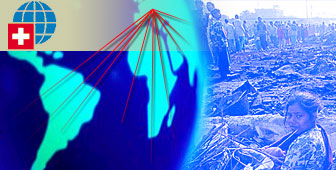Switzerland combats digital divide

In countries like Switzerland and the United States, half the population has access to the Internet and that figure is increasing every day. In developing countries, however, the information revolution is largely passing people by.
As a result, most of the world’s poor are not benefiting from the changes that speedy and easy access to knowledge and information is bringing to developed countries. Now, Switzerland is taking measures to tackle this digital divide.
It hopes to use its presidency of the Global Knowledge Partnership network to advance the spread of new technologies to developing countries. The network, created five years ago by the World Bank, is now supported by governments, businesses and non-governmental organisations.
Global Knowledge Partnership
Walter Fust, the head of the Swiss Development Agency, told a news conference on Thursday that Switzerland’s aim was to ensure that poorer countries did not miss out on the benefits of the digital age.
He said that as well as passing on information about new technologies to developing countries, the Global Knowledge Partnership had a duty to ensure a better use of local knowledge.
Fust was speaking two days after a United Nations Development Programme report underlined the “major potential” of new technology to combat poverty and reinforce democracy.
“There’s been a huge difference in the growth and economic dynamics of those countries which have access to information technologies and those which don’t,” said Gerolf Weigel, head of the Swiss Development Agency’s unit responsible for multilateral initiatives.
“Even within countries there are groups of people who don’t have access and are economically left behind. There is also the gender divide with all the consequences that entails.”
“When it comes to content, we still have the big problem that most of the information on the Internet is produced in industrialised countries and local content is still not really available,” said Weigel.
Experts say a series of measures are needed to close, or at least reduce, the digital divide.
According to Weigel, one priority is education so that people benefit from the information they find on the Web. The Swiss Development Agency also puts a lot of store in promoting community programmes.
Access to information
“Individual access to information is very important in industrialised countries whereas in developing countries, we should put much more emphasis on multi-user access or community access.
“For example, we support a programme in Sri Lanka where a community radio is linked to the Internet. It’s a great help that you can reach thousands of people with one Internet access and translate the information into relevant local knowledge and have two-way communication.”
A world summit on the information society is scheduled for 2003. Hopes are high that it will allow the international community to coordinate efforts to close the digital divide.
by Vincent Landon

In compliance with the JTI standards
More: SWI swissinfo.ch certified by the Journalism Trust Initiative
You can find an overview of ongoing debates with our journalists here. Please join us!
If you want to start a conversation about a topic raised in this article or want to report factual errors, email us at english@swissinfo.ch.